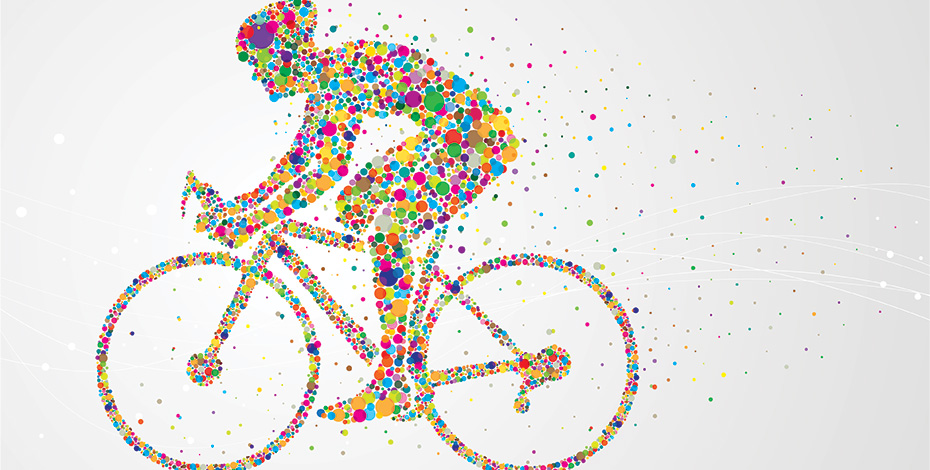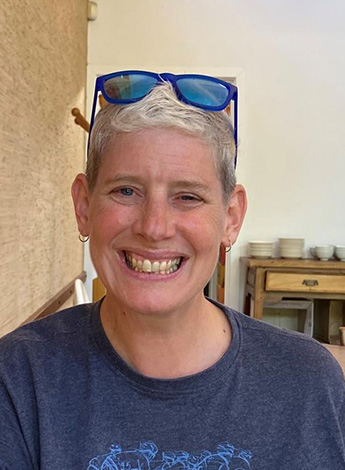
Diversity and inclusion in cycling

Physiotherapist and member of the APA LGBTQIA+ advisory panel Susan Mitchell has a special interest in inclusion and diversity in workplaces and sport. Here she talks about her experiences in cycling.
I have long been interested in understanding and helping to create inclusive and diverse workplaces and sporting environments, particularly in cycling.
I started cycling for fun after an anterior cruciate ligament reconstruction, chondroplasty and mosaicplasty and have now been a member of a women-only cycling club in Adelaide for over 15 years.
With more than 30 years’ experience working as a physiotherapist in occupational health and manual handling training, for the past 10 years I have also been working my way through Commissaire (cycling official) courses.
As an Elite National Commissaire for road and National Commissaire for track, mountain bike and cyclo-cross events, I’ve had the opportunity to work at the highest level
in Australia.
Through these roles and my personal involvement, I’ve become very aware of the differences in support and coverage of women’s cycling (and other sports) compared to men’s.
In professional cycling, the visibility of openly gay, lesbian and non-binary athletes is limited compared to other sports.
Only a small number of male cyclists are currently out as LGBTQIA+, while speculation about the sexual orientation of athletes persists, especially in the women’s peloton.
However, one lesbian cyclist spoke out against assumptions and excessive curiosity about athletes’ sexuality, emphasising that cycling provides a welcoming and accepting environment where she has not experienced homophobia.
While there may be limited visibility of LGBTQIA+ cyclists at the international and national levels, cycling can be inclusive and supportive at club and social levels, with transgender women participating in community events.
The international governing body, Union Cycliste Internationale, has revised its policy on transgnder women competing at the highest level following controversial cases, leading to divisions within the cycling community.
It is crucial for officials to collaborate with riders to ensure the safety and inclusivity of all participants in cycling events.

Susan Mitchell.
As a gay woman and one of the few openly LGBTQIA+ officials in cycling, I aim to be a role model and to provide support to fellow women and members of the rainbow community, fostering a comfortable environment in a sometimes challenging field.
I have been fortunate not to experience direct discrimination based on my sexuality in my career as a physiotherapist or through my involvement in cycling.
My sexuality is accepted in this sport and has even given me opportunities to bring more gender diversity to events.
For example, I lead the Inclusion and Diversity subcommittee established by the AusCycling Technical Commission, which actively works towards gender balance in teams.
usCycling, Australia’s peak cycling body, has made significant progress in terms of policies and regulations, with a strong commitment to creating equitable environments and practices.
As a friend of mine put it, AusCycling is focusing on awareness, allyship and understanding the experiences of their people and communities as a way of driving meaningful change.
Physiotherapy has helped me learn and grow in my role as a Commissaire.
For an official working with cyclists, core physiotherapy skills such as effective communication with various stakeholders, consistency and building quick rapport are crucial.
Cycling is a rule-heavy sport and there is a need for fair judgement and consistency, particularly in situations with varying degrees of clarity.
The ability to think and act under pressure is essential because incidents and emergencies may arise during events.
Despite the challenges, the teamwork, friendships and travel opportunities within Australia have made my journey in cycling enjoyable.
The combination of flexible working hours, a supportive manager in occupational health and the skills acquired during 30 years of physiotherapy have provided me with new opportunities.
>> Susan Mitchell (she/her) is a physiotherapist based in Adelaide who loves working with diverse groups of people in all industries. Susan is a member of the South Australian Branch of the APA’s Occupational Health national group and has previously been on the State Branch Council of the APA. She heads the Inclusion and Diversity subcommittee of the AusCycling Technical Committee.
© Copyright 2025 by Australian Physiotherapy Association. All rights reserved.





